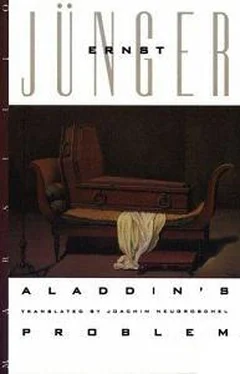Stellmann emerged from the orderly room. The senior N Co reported. Stellmann inspected the squads. This took a long time, for he was thorough. If anyone drew Stellmann's attention, the man's name was noted, and he had to fall in again that evening. At last, Stellmann came to us, and then to me.
I saw him for the first time: a delicate man in a smart uniform. He had to be a good fencer — the kind who suddenly lunges with his foot. His face was pale; the pallor was emphasized by a small black beard. A certain elegance could not be denied: a soft swaying and rolling reminiscent of a bird's, plus the superior self-confidence of a man who knows his business.
I stood at attention; he ordered me to show him my gear. All the while, he kept staring at me; he had seen through me at first glance. And I too knew whom I was dealing with. It feels odd being stripped by the eyes; it is the prelude to rape.
Right off the bat, he disliked my shirt. Although I had made sure on the previous evening that all the buttons were sewn tight, he said that every one of them was hanging by a thread, and he pulled one out — along with a scrap of the worn linen.
In such cases, men like me have to avoid showing even a trace of irony; I made sure not to contradict him, I remained at attention, playing dead. But there are situations in which anything you do is wrong.
Stellmann took out his thick notebook, which, normally wedged between the second and fourth button, is part of an officer's service uniform. He asked me what my name was, and he wrote it down.
"Report to your patching lesson at 0500 hours!" Dispensing with any further inspection, he wheeled around and focused on the next man.
Now I had a pursuer who stalked me and would not release me from his clutches. If the roster included an unpleasant perquisite, say, guard duty on the railroad to Schweidnitz, then I could bet that I would be detailed — and naturally, he would pick Saturdays and Sundays. It was no use my sneaking into the second row when we fell in: he would scour the gaps until he spotted me.
13
Thus it went on, but I do not wish to go into the afflictions, which kept growing worse and worse. It was obviously hate at first sight, hate for no reason — our horoscopes must have been completely disparate. Or had he sniffed the aristocrat in me, whom I had sloughed off long ago and effaced from my memory? Although I tried to stay free of it, I nevertheless thought about my tormentor day and night; he remained a thorn in my side, whether or not he was present. Once, when we crossed paths on the stairway, I heard him whisper: "I'll get you into prison." — it was a soliloquy and not meant for my ears. We passed one another like two sleepwalkers.
The man was universally feared and especially by me. There was something sinister about him; military service was merely an excuse for him to satisfy that sinisterness. He would have been dangerous in any circumstances, even without authority of command. This was shown when it was dark. Ifthe company lined up on the parade ground in winter, it was often so dark that you could not see your hand before your face. After the roll was called, Stellmann had fifteen minutes left to straighten up the squad before the captain appeared. Stellmann ordered us to reform column and he drove us around the quadrangle in double time; then came, "Assemble, right and left!" and "Hit the dirt!" We had to boom down like one man falling. He made us repeat it until we got it right: "Goddammit! I'll throw the parade ground in your faces!"
We heard his voice; no one saw him, but everyone trembled. He was the tamer; we were the beast.
After that mental preparation, field duty was truly relaxing for us. The captain was satisfied — it all went like clockwork; Stellmann was an outstanding sergeant.
14
Thinking back, I wonder why I simply did not remain standing when he threw us to the ground. It was dark; he would not have seen me. All of us could have remained standing until he had shouted himself hoarse; then the whole fuss would have been over and done with. But things are not that simple.
Aside from that, I had nothing against the drill per se; this may be a rudimentary memory. There are moments of universal consent, when everything works.
My ancestors also achieved a thing or two in that respect, especially during the Baroque period. After all, running a gauntlet is no piece of cake. But there was something else next to it, below it, and above it, which, at least in hindsight, mellows if not sanctions the suffering. It was part of the era; this is proved by buildings and artworks — from songs and paintings to handicrafts: pewter, silver, porcelain. These things still comfort us today in sounds and sights; plus the free thought of the great systems to the point of self-irony. Once, at the mounting of the guard at Potsdam, Frederick the Great, "Old Fritz," asked one of the generals: "Do you notice something?" The general had no answer, and the old king said: "There are so many of them and so few of us." Perhaps that was the day on which James Boswell, a Scottish liberal, indeed an anarch, was thrilled by the spectacle.
Compared with their uniforms, which the ladies also liked so much, ours are ugly and gray. We live in times that are unworthy of an artwork; we suffer without apology. Nothing will remain but the sound of Sheol. Today, coercion is still approved. Yet, at the same time, grief grows, spreading all the way to the Africans, and my melancholy takes part in it.
15
Needless to say, I racked my brain about how to get rid of my tormentor. A war was out of the question (it automatically solves many problems). I pictured us marching out, to the accompaniment of music, and reaching the front. As soon as we fanned out in the skirmish line, I would kill Stellmann. This was a delight — you have to know your enemy. But there was no chance of war, although everyone was talking about it; besides, in case of war, the men on the army list stay behind in the orderly room. They are the least expendable.
Naturally, I also thought about deserting; but there were snags. The borders were almost impassable, and many obstacles had to be overcome before you reached the mine belt. Only choice men were detailed there as guards. At the very least, you had to find a buddy — but who could be trusted? Anyone might be an agent. I rejected the idea; I'm not one for foolhardiness.
Aside from that, the word "desertion" does not sound appealing to me. I am backward in such matters — not, of course, because I would honor contracts made with atheists. Even atheists do not renounce an oath of allegiance, although they may have another word for it. I was indifferent to that, but not to my self-respect. Finally, I could shoot myself at the rifle range or while cleaning my gun. Stellmann, no doubt, would have labeled this a self-mutilation, and he would not have been mistaken. Self-mutilation is regarded as second only to suicide, the acme of desertion. That is why there are extremely shameful rules for interring suicides. Who does not know the night of sorrow? Tossing and turning on my straw pallet, I became a shadow of my former self Physical destruction was preceded by moral destruction. In the end, such a case inevitably calls for prayer.
16
I cannot judge whether it helped. In any case, there was a turn of events, whatever may have led to it.
Escalading was one of our captain's obsessions; no exercise went by without our being driven across a series of obstacles. The captain stood there with a stopwatch. We leaped over hurdles and ditches, clambered up scaling ladders, squeezed underneath barbed wire. At last came the escalade wall; it was high. That morning, I had made good time. Normally, you climb down the other side using only your hands; I wanted to do something extra, so I jumped down. The result was a broken leg; the medical orderlies had to carry me away.
Читать дальше












